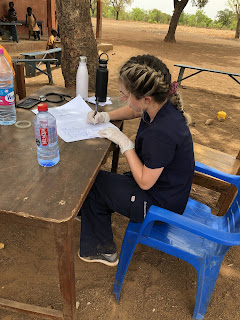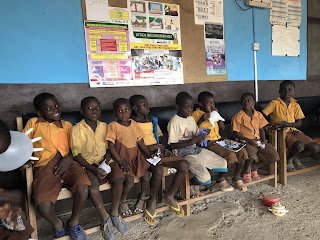Ghana is a country that can be summed up in a million
words or none at all. It’s a country and people that you can only scratch the
surface in trying to explain with descriptions and pictures.
Being back here three years after my time as a student, I
often found myself comparing the experience to last time. I’m sure the students
have heard enough of my comparisons. We have done the same travel days, the
same clinical placement, the same safaris in Mole, and beach days on Cape Coast.
It should feel like I’ve done the same trip as last time,
but it was vastly different.
Jeanette and I (along with the group catching on and
joining in) have come up with our catchphrase “Upgrade!” From things as simple
as wifi in the immigration hall at the Accra airport to finding out our clinic
at Chenshegu has been staffed and functional since we left last year. There have
been plenty of times to exclaim “Upgrade!”
It has been amazing to return to this country and see the
progress that can happen in just a few short years. We often explain to the
students about how we aren’t here to “do” but to observe and learn. It’s a
difficult thing to wrap your head around when nursing school is all skills and
to do lists. It can often feel like we are here doing nothing helpful. But the
change and community development that is happening here with our program is
palpable and obvious. Simply bringing students here to engage and learn in
healthcare here makes a difference. And we have all learned... the change usually
happens in ourselves and not in our Ghanaian partners.
The students have explained it all throughout our blog
posts. The learning is not always in clinical but just by being here and
experiencing this wonderful culture and people.
As much as there has been “upgrades” every step of the
way. There is also no need for upgrades in many areas. Being back has reminded
me that Ghana, and especially the northern region, has not changed and should
not change. All our partners who we continue to work with remain a constant in
this program. Our Ghanaian friends and colleagues are amongst the most
intelligent, hard working and generous people on the planet. We have all
learned so much from them and we wish them never to change.
I think I can speak for us all when I say that that we
all are so grateful and honoured to have worked with our friends here. We will
miss then so much and carry them with us as we leave.
It has been truly an honour to be back. It’s been an
honour and a pleasure to walk alongside these students on the last part of
their BSN journey. It has been a pleasure to share my time here with Jeanette
as a colleague and a friend. And it has truly been an honour to be back in
Ghana.
I, myself, truly have been upgraded again by this place.
Mara Macauley BSN, RN
UBC Okanagan Alumni
Class of 2016







































